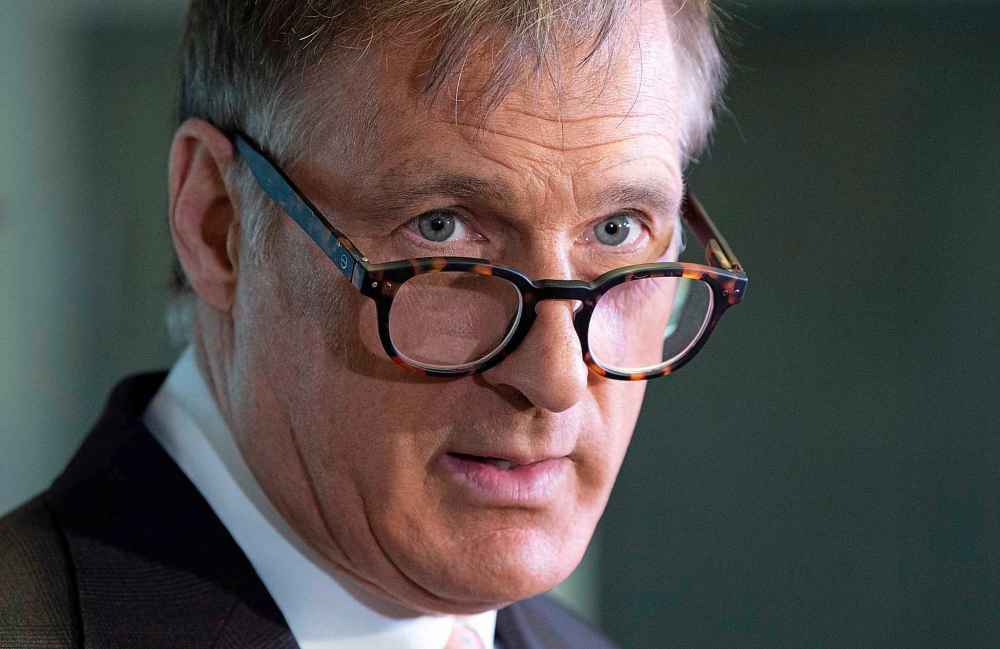Upstart-party leader Maxime Bernier must avoid embarrassment
Read this article for free:
or
Already have an account? Log in here »
To continue reading, please subscribe:
Monthly Digital Subscription
$0 for the first 4 weeks*
- Enjoy unlimited reading on winnipegfreepress.com
- Read the E-Edition, our digital replica newspaper
- Access News Break, our award-winning app
- Play interactive puzzles
*No charge for 4 weeks then price increases to the regular rate of $19.00 plus GST every four weeks. Offer available to new and qualified returning subscribers only. Cancel any time.
Monthly Digital Subscription
$4.75/week*
- Enjoy unlimited reading on winnipegfreepress.com
- Read the E-Edition, our digital replica newspaper
- Access News Break, our award-winning app
- Play interactive puzzles
*Billed as $19 plus GST every four weeks. Cancel any time.
To continue reading, please subscribe:
Add Free Press access to your Brandon Sun subscription for only an additional
$1 for the first 4 weeks*
*Your next subscription payment will increase by $1.00 and you will be charged $16.99 plus GST for four weeks. After four weeks, your payment will increase to $23.99 plus GST every four weeks.
Read unlimited articles for free today:
or
Already have an account? Log in here »
Hey there, time traveller!
This article was published 05/11/2018 (2594 days ago), so information in it may no longer be current.
Maxime Bernier, who is rapidly organizing local committees of his newly-founded People’s Party of Canada (PPC) across the country, is trying to filter out problem supporters. He is making local leaders sign a pledge that they have done and will do nothing that would embarrass the party.
The party is wise to take some precautions along these lines. Every election and every nomination fight within a party sends party operatives combing through social media posts and other online sources in search of evidence of the foolish or offensive statements that most people have uttered at some point in their lives and that now live on forever in digital storehouses. The worst howlers can be publicized to discredit an opponent. A party leader’s best defence is to find out about these gaffes before the other side does.
New parties such as the PPC and Jason Kenney’s United Conservative Party in Alberta have a special problem because anti-Semites, Holocaust deniers, xenophobes, flat-Earth advocates and others remote from the political mainstream are always out there, looking for a political party to infiltrate. A new party quickly gearing up for an election is terribly vulnerable. Even with a careful vetting system, a few people with inexplicable items in their past are likely to turn up on the candidate lists.

But what are the PPC’s standards for embarrassment? In 2008, when Mr. Bernier was minister of foreign affairs in the Stephen Harper government, he seemed embarrassed at first by the news that he had left a government briefing book in the apartment of his girlfriend, Julie Couillard. He resigned from the government. It was never clear what he was embarrassed about — was it Ms. Couillard’s former ties to biker gangs, or his own carelessness with state papers?
More recently, however, Mr. Bernier has overcome that embarrassment. He ran to lead the Conservative Party last year, and after Andrew Scheer won the leadership, he quit to form his own party. He is vying for the job of prime minister of Canada despite his former misjudgment. Since the PPC is not embarrassed to have such a leader, it may have to be equally tolerant of old gaffes among its grassroots members. The embarrassment of 2008 has faded with the passage of time.
The party said recently it had signed up more than 30,000 members and organized local associations in 101 of Canada’s 338 federal electoral districts. These figures suggest that the PPC is well on its way to becoming a significant player in the general election that is due less than one year from now.
Will the party be embarrassed by some of those 30,000 members or the thousands more who may be recruited in the coming weeks? That depends partly on what baggage those members bring with them, and partly on Mr. Bernier’s thickness of skin. The non-embarrassment pledge will at least give Mr. Bernier grounds for expelling those by whom he is embarrassed, reasonably or not.
The PPC’s recruitment claims suggest that Mr. Scheer and the Conservative Party have not achieved the monopoly they need on the right wing of Canadian politics. The experience of the 1990s with the Reform Party and the Canadian Alliance showed that when the right is divided, the Liberals win. If Canada’s conservatives repeat that exercise, they should all be embarrassed.








